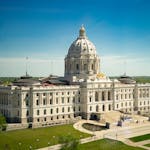President Donald Trump called for a bipartisan effort to pass an infrastructure bill in his latest State of the Union speech. Secretary of Transportation Elaine Chao echoed the same sentiments shortly after the speech. Yet both failed to provide a few details as to what ought to be included in such a bill, and leaving the details to Congress is problematic.
So far, most congressional discussions on any infrastructure bill have focused on ways to fund more federal spending. Letting Washington simply throw more dollars at roads and bridges, however, is a bad idea. Whatever we spend, politicians should take steps to ensure we get the highest return possible for our transportation dollars.
The standard line in Washington is that U.S. highways and bridges are crumbling. Anecdotal evidence aside, this is not true. In fact, when I looked at objective measures of highway and bridge conditions between 2005 and 2014, I found overall highway quality has been relatively stable. Bridge quality, overall, has even improved.
Digging deeper into the data, it turns out that highways and bridges are in bad condition in some states but in good condition in others. Most highways in Arizona, Illinois and Florida are in pretty good shape, while many in Hawaii, California and Louisiana are in poor condition. The story is much the same with bridges.
Washington politics are a blunt instrument, and probably won't be able to narrow these differences. Illinois' representatives aren't going to give up some of the federal gasoline tax their constituents paid in order to improve highways in California. Indeed, if infrastructure funds are allocated by the federal government, political pressures will result in a fairly equal state-by-state distribution of the funds, which will fail to place funds where they are most needed.
For this reason, officials in Washington should play a more limited role in managing highway and bridge infrastructure spending by letting states decide what to do with their own gasoline taxes. Shifting most of the funding and decisionmaking to the states and — even better — to local governments helps ensure that our money goes where it is truly needed rather than politically expedient projects.
This is similar to what economists Monica Escaleras and Peter Calcagno found when researching how decentralization affects infrastructure. States that allowed greater decisionmaking at the local level had better quality highways and bridges. Most highways and bridges are used by people living in that area, so information about the condition of these roads and bridges is best known to local officials. States and cities are in the strongest position to make transportation infrastructure decisions.
With cities and states taking on greater responsibility for their own highways, the federal government could take on full responsibility for the nation's Interstate Highway System.
If our federal representatives want to make a real difference, one specific highway reform could help solve two more pressing problems than "crumbling" roads and bridges. Congestion is a major problem in most U.S. cities. In addition, because of improved vehicle fuel economy, gasoline and diesel tax revenue have not been sufficient to finance the highway trust fund.
To address both, Congress could lift existing federal restrictions on tolling interstate highways. That would enable us to reduce our reliance on waning fuel taxes and replace them with variable tolls that are collected electronically. This would raise funds for new construction and maintenance. Commuters' willingness to pay the tolls shows which commute patterns have the most value, allowing leaders to choose infrastructure spending projects more efficiently. Some or all of the costs can be offset with lower fuel taxes.
Charging higher tolls during rush-hour drives also creates incentives to shift trip times, car pool or use existing public transit, improving traffic flows. Reducing congestion increases the type of economic mobility that spurs economic growth.
This reform agenda requires Washington politicians to set aside politics, which might be asking too much. A shift to local control would increase the efficiency of infrastructure spending, but it would require our leaders to cede some of their own control and forgo politically popular federal projects. But we don't need more questionable building projects — we need leadership.
Robert Krol is a professor of economics at California State University, Northridge and a senior affiliated scholar with the Mercatus Center at George Mason University. He writes regularly on infrastructure issues.



